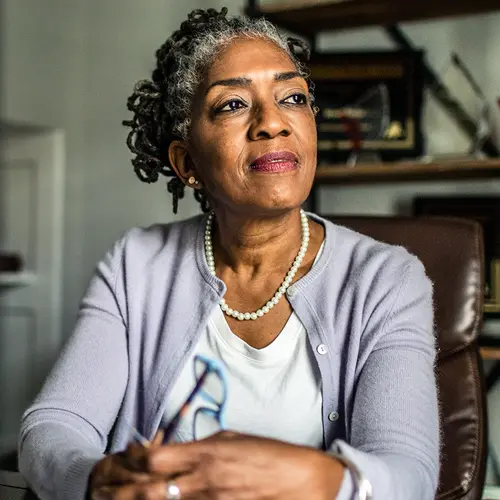My Story: A Virtual Perspective (Part 1)

Hide Video Transcript
Video Transcript
[MUSIC PLAYING]
Using the elliptical in the gym was very good cardiovascular exercise that really didn't tax my joints very much at all. Swimming is very good on my joints. It helps my body be supported while I'm moving. There's a lot patients can do to mitigate this for themselves. They don't have to just let the doctor be the boss of them and just rely solely on drug treatments and therapies for them to feel better, because there's a lot in your own control.
As soon as I was diagnosed, I went looking for an activity. I found the Walk to Cure Psoriasis online. And from there, I was able to meet other patients and connect in person and make friends who really understood what it's like to live with psoriatic arthritis. It just blew my mind when I found other, so many other patients with my condition, and just to hear their stories and feel that camaraderie and people who really understood me made a huge difference in how I felt about myself and what I felt I was capable of.
I couldn't have gotten through it without my community, because your family can never understand like a peer. I run across patients all the time online who feel really alone with their psoriatic arthritis. Their friends and family members maybe don't believe that they're really sick or they just don't have the support they need and having this animosity with those they love.
But when you widen your support network by finding other patients who understand and have your condition and maybe all they could do from far away is say, I get it, I'm really sorry that's happening to you, means the world to folks. So I always encourage them to find peers in the community that they can connect with, because even when your support isn't as great as it needs to be at home, you should never feel alone.
LORI-ANN
I had psoriatic arthritis symptoms a good 25 years before I was diagnosed. For me, being active with psoriatic arthritis was something that really needed to be balanced quite well. We always say that motion is lotion. The more you move, the more range of motion you tend to have. After my diagnosis, it was a bit like getting a punch in the gut. But then you rally. I immediately started researching best foods to avoid and best foods to increase and boost the immune system. And also, what movement would be best for me, what kind of exercise could I add without hurting myself. Using the elliptical in the gym was very good cardiovascular exercise that really didn't tax my joints very much at all. Swimming is very good on my joints. It helps my body be supported while I'm moving. There's a lot patients can do to mitigate this for themselves. They don't have to just let the doctor be the boss of them and just rely solely on drug treatments and therapies for them to feel better, because there's a lot in your own control.
As soon as I was diagnosed, I went looking for an activity. I found the Walk to Cure Psoriasis online. And from there, I was able to meet other patients and connect in person and make friends who really understood what it's like to live with psoriatic arthritis. It just blew my mind when I found other, so many other patients with my condition, and just to hear their stories and feel that camaraderie and people who really understood me made a huge difference in how I felt about myself and what I felt I was capable of.
I couldn't have gotten through it without my community, because your family can never understand like a peer. I run across patients all the time online who feel really alone with their psoriatic arthritis. Their friends and family members maybe don't believe that they're really sick or they just don't have the support they need and having this animosity with those they love.
But when you widen your support network by finding other patients who understand and have your condition and maybe all they could do from far away is say, I get it, I'm really sorry that's happening to you, means the world to folks. So I always encourage them to find peers in the community that they can connect with, because even when your support isn't as great as it needs to be at home, you should never feel alone.
